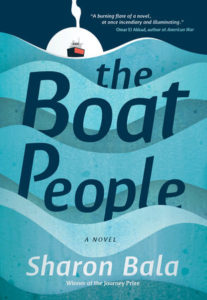 “I’m an extrovert, in case you haven’t noticed,” Sharon Bala says, her enthusiasm and warmth carrying across the phone from chilly Newfoundland to chilly Nova Scotia. She’s commenting on the hectic schedule for launching and promoting her new book, The Boat People. “It’s demanding,” Sharon says, “even for an extrovert.”
“I’m an extrovert, in case you haven’t noticed,” Sharon Bala says, her enthusiasm and warmth carrying across the phone from chilly Newfoundland to chilly Nova Scotia. She’s commenting on the hectic schedule for launching and promoting her new book, The Boat People. “It’s demanding,” Sharon says, “even for an extrovert.”
The Boat People (McClelland and Stewart, 2018) was inspired by events in 2010 when the Sun Sea cargo ship brought almost five hundred Sri Lankan Tamils to British Columbia. All of the passengers made refugee claims in Canada but were detained amidst heightened security concerns stirred by the Harper government. Bala writes her novel around Mahindan, a single father travelling with his son, Sellian, but the The Boat People shifts viewpoints, giving readers a broad and enlightening perspective. We not only hear Mahindan, but also Grace, the adjudicator in Mahindan’s case, and Priya, his lawyer.
The Boat People has earned rave reviews. Bala also won the 2017 Journey Prize for her short story “Butter Tea at Starbucks” and was long-listed for the same prize for “Reading Week.”
Sharon Bala took time to talk with Understorey Magazine editor Katherine Barrett about her novel and the writing process.
Katherine Barrett: In a recent essay, you mentioned that you weren’t a writer when the Sun Sea arrived in Canada in 2010. You’ve now won a major literary prize and published an acclaimed book. How did that happen?
Sharon Bala: I wrote stories all the time when I was young but stopped when I went to university. I didn’t write at all throughout my twenties. In 2009, my husband was offered a year-long job in Oxford, England. I decided to use that time to return to writing and wrote a book that has never seen the light of day. When we moved to St. John’s in 2010, I returned to my career in marketing but also took a writing class with Jessica Grant. I realised that I should have been writing all along. I felt like I’d wasted a lot of time and decided then that I’d try to become a serious writer.
KB: Did you start with your novel or with short stories?
SB: Definitely with short stories. I finished five short stories in my writing class and began to send them out to magazines and contests. The stories were terrible but by entering writing contests, I also received subscriptions to literary magazines. I suddenly had all these magazines arriving at my door. Reading them, I gained more appreciation for the short story, learned to hone my craft and also became clearer about the themes I wanted to explore. [Bala subsequently published in many literary journals!]
KB: You are a member of a writing group. What role does that play in your writing practice?
SB: It’s essential. We now know each other well enough that we skip “This is good” or “I liked this.” We just pull the work apart and say what’s not working. That has helped me improve much faster than I would have on my own.
KB: All of the characters in The Boat People are very complex, very three-dimensional. Did you plan this beforehand or did the characters evolve with the writing?
SB: I didn’t plan it but all of my writing is driven by characters. I always know a lot about my characters, much more than ever gets on the page. My undergraduate degree is in psychology and history, so that probably helps. I’m interested in the gap between the way you see yourself and how others see you. For instance, the characters in The Boat People see themselves as novices. They all think other people have more power. I was also influenced by books like Half of a Yellow Sun and Little Bee where characters have to make morally ambiguous choices. Mahindan is the heart of The Boat People and while writing I realised that no one could survive what he had survived without, at some point, making a morally ambiguous decision. So I put him in that position.
KB: How has researching and writing the book affected the way you read current news about immigration and refugees?
SB: I’ve learned that if you repeat something many, many times, it can become the truth [passengers aboard the Sun Sea were often described as terrorists; polls at the time showed most Canadians wanted the boat sent back]. So I now have a more nuanced view of the truth; the grey area has expanded. I’ve also realised that public opinion and government policies on these kinds of issues come in waves. I’m more cautious, less likely to get excited, when hearing the news.
KB: A style question: You don’t use quotation marks in your book. Why not?
SB: I have a philosophy about writing: something should always be left for the reader. In many parts of The Boat People, there are different layers of voices and meaning. For instance, in the chapter Back to Hell, Grace is overseeing an admissibility hearing. She listens to Hema’s story through an interpreter and tries to decide what is true and what is fabricated. It’s often impossible to tell so I wanted to leave some uncertainty, some room for the reader.
KB: What’s next for you?
SB: [Laughing] I’m working at practicing radical acceptance! Actually, I started another novel last summer and am getting back to work on that.
Watch for Sharon Bala’s short story “Quickening” in Issue 13 of Understorey Magazine.

